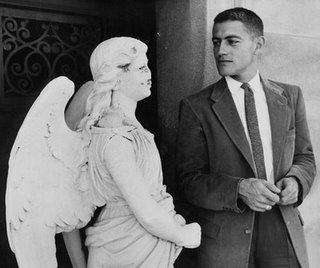Robin Blaser, 1925-2009: Death’s Duty

Robin Blaser
The poet Robin Blaser died of a brain tumour on May 7, 2009, in Vancouver, at age 83.
One of the first poems of Blaser’s to which I paid attention, published in editor Don Allen’s anthology, The New American Poetry, 1945-60 (1960), was an untitled sonnet-like work that begins, “And when I pay death’s duty / a few men will come to mind.”
I was fascinated by the triple-pun-like meaning of the second line. In Blaser’s imagining of his own death, written at age 30 or so, in 1956, he says that as he pays Charon the boatman the standard one-obol fee (that’s one meaning of “death’s duty”) to ferry him across the River Styx to the Underworld, a few of those he knew in his life will appear before his mind. “Death’s duty” also means, more obviously, that we have a duty to pay to death, namely, our lives.
At the same time, “a few men will come to mind” has two more meanings that are to be found in the double sense of the verb “to mind,” as meaning both “to attend” and “to object.” When the poet pays death’s duty, a few of the men and women he knew will come to attend his death. They will be his “minders” at the ceremonies of death, as they were in his life and during the process of his dying. Finally, a few of those he knew will “mind” that he died, that is, they will object to, be troubled by, and will mourn his death.
When he pays death’s duty, “the big question” for Blaser “is what it will feel like with eyes wide open. / It won’t be complete darkness because there / isn’t any…” Until I read the poem (I was 19 then), I hadn’t known there isn’t any “complete darkness.” However, “One thing will stop and that’s this / overweening pride in the peacock flesh.” Having discovered “disgust” “in the wrinkling flesh” of aging, the poet recognizes that death will, if nothing else, put an end to our vanity, our “overweening pride in the peacock flesh.”
At the end of the poem, Blaser says, “And when I pay death’s duty / the love I never conquered / when young will end as such.” I found those last lines puzzling and was never quite sure what they meant. They meant, of course, that just as our vanity ends with death, so will our never-conquered, unrequited love. I only later realized that one of the reasons that I was uncertain of the meaning of those lines is that I made a crucial mis-reading of them: I replaced the word “end” with the word “remain,” so that it read “the love I never conquered / when young will remain as such,” and I imagined those who had been loved remaining, untouched by time and aging, “as such.” Those who had been loved are the immortals of our mortality.
I’m afraid that my mis-reading says more about me than about the poem, but since I’m one of those who have “come to mind,” mis-reading joins the reading of the poem. What’s more, it was a mis-reading that Blaser was inclined to accept on the occasions we talked about it.
In any case, “when I pay death’s duty” is a poem that I not only attended to, but that stayed in mind through the almost 50 years that I knew Blaser as a friend, intimate companion, and master. That last word, “master,” also has multiple meanings: Blaser uses it in his poetry as a submissive address to the powers in language greater than ours: “O, master.” But it also means master of the art or craft of poetry, which Blaser was and, in a more conventional sense, it simply identifies Blaser as one of our teachers, as he was to the large number of people who were his students.
A few years ago, I brought Blaser a poem I’d written, titled “Friend,” that begins, “The law of friendship is / one of us must die // before the other / Mourning begins // before death…” It was a poem I wrote upon reading Jacques Derrida’s book, The Work of Mourning, and after Blaser performed the prescribed task of the master or peer of confirming (or not confirming) that it was a poem, we sat in his kitchen, drinking coffee (as we’d done countless times before), and talked about the recently dead philosopher, Derrida, who had inspired the poem, and provided lines for it.
Then I read it aloud again (another custom of the poetry trade), and Blaser looked up afterwards, and slyly asked, “Is that for me?” I was taken aback, startled that he was asking something more than a conventional question about whether the poem was dedicated to him, as in “for Robin.” I hadn’t thought about it before he asked. Am I the “one” who “must die // before the other” in our friendship? Is this the beginning of your mourning for me? “Who else?” I replied, without thinking, then added, “or for whichever of us,” since I too, though it was less likely, could be the one.
Three months before Blaser’s death, on the day before I was leaving Vancouver for Berlin, in early February 2009, I visited Blaser at Vancouver General Hospital once more to say goodbye. We went downstairs so that he could smoke a cigarette, to a parking lot outside one of the hospital’s back entrances. He was in a wheelchair, looking reasonably elegant with his shock of white hair, and wearing a thick dark bathrobe. The tumour had progressed so that present memory dissolved every thirty seconds or so, and he frequently repeated questions he’d asked only a minute before, but his recognition of others and past memory remained.
The moment of departure arrived in the chill February sunshine, while the hospital behind us and the traffic on the street across from the parking lot both continued to hum in their daily rhythm, as if a permanent break between us wasn’t about to happen.
“Well, I guess this is goodbye,” I said.
He suddenly focused. “This really is goodbye,” he said.
“Yes, it is,” I said, once more (as on countless occasions) startled by his sudden coherence.
“Don’t forget me,” he said.
“I won’t forget you, Robin,” I said, almost as if I’d been accused of forgetting.
Then, with some effort, he visibly pulled himself together, looking up at me from his wheelchair, and in a voice both tearful and ferocious, said, “I won’t let you forget me!”
So, let the muses weep; they, after all, have more time on their hands than we do. As for us, the temporarily living, we won’t be allowed to forget Robin Blaser.
.
Berlin, May 8, 2009. A more extensive appreciation of Blaser’s poetry is available on Dooney’s. Go to related article below, click on “About Robin Blaser,” and you’ll be taken to the earlier essay.


